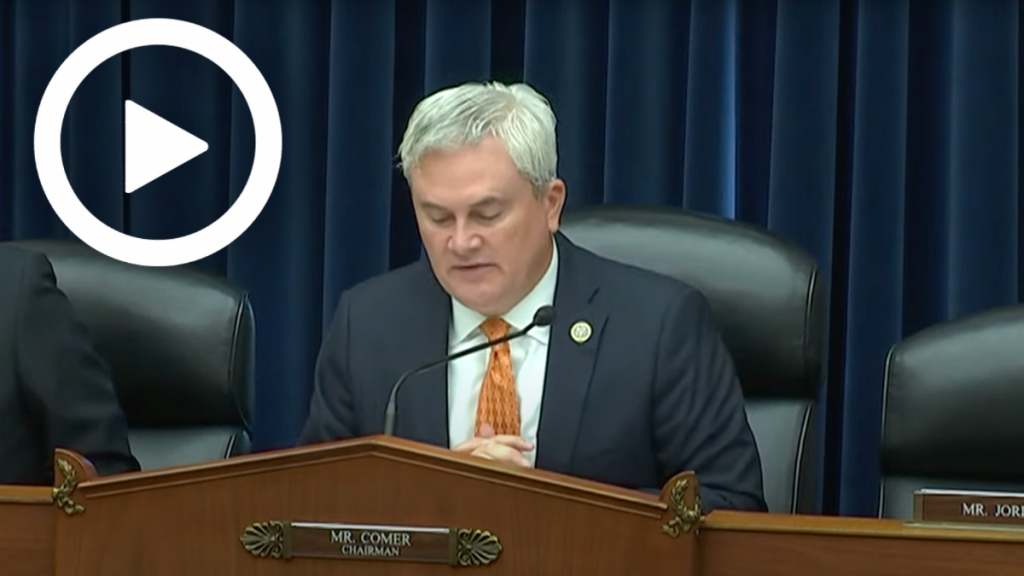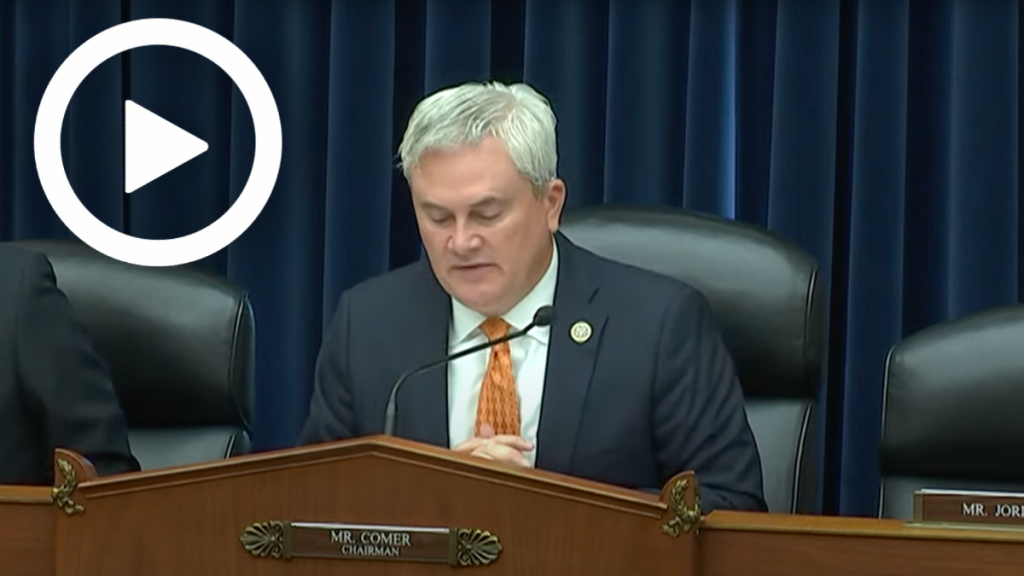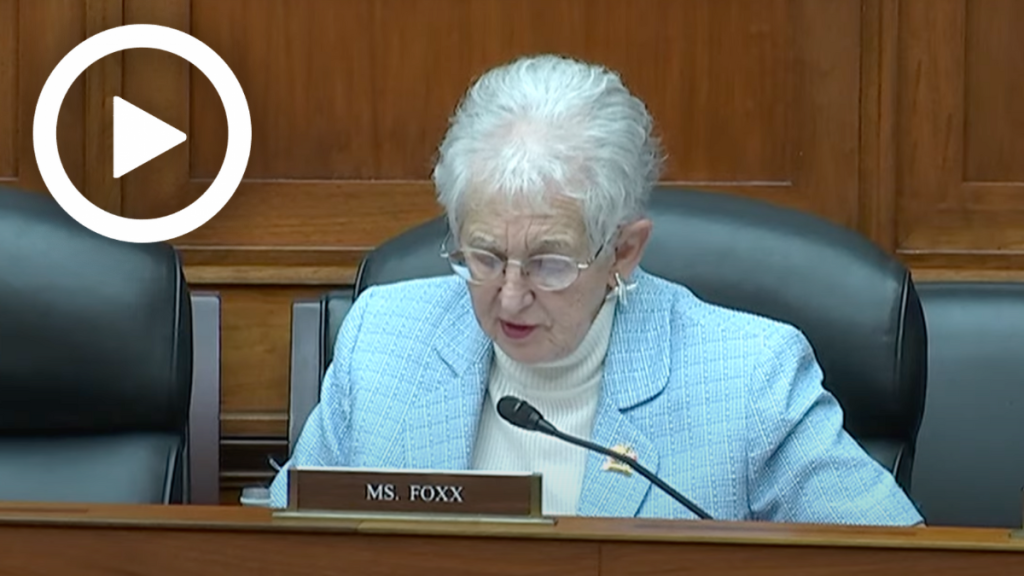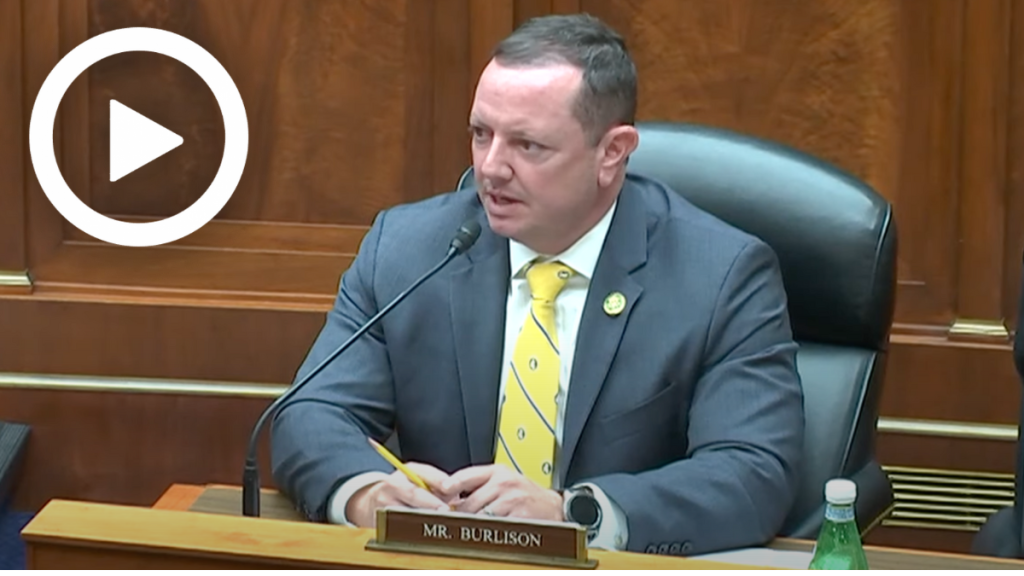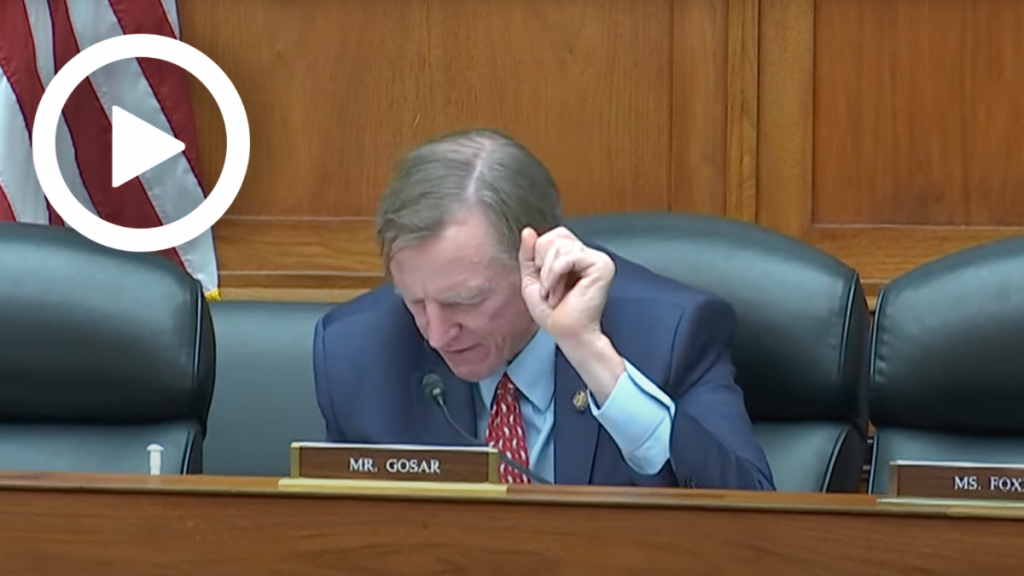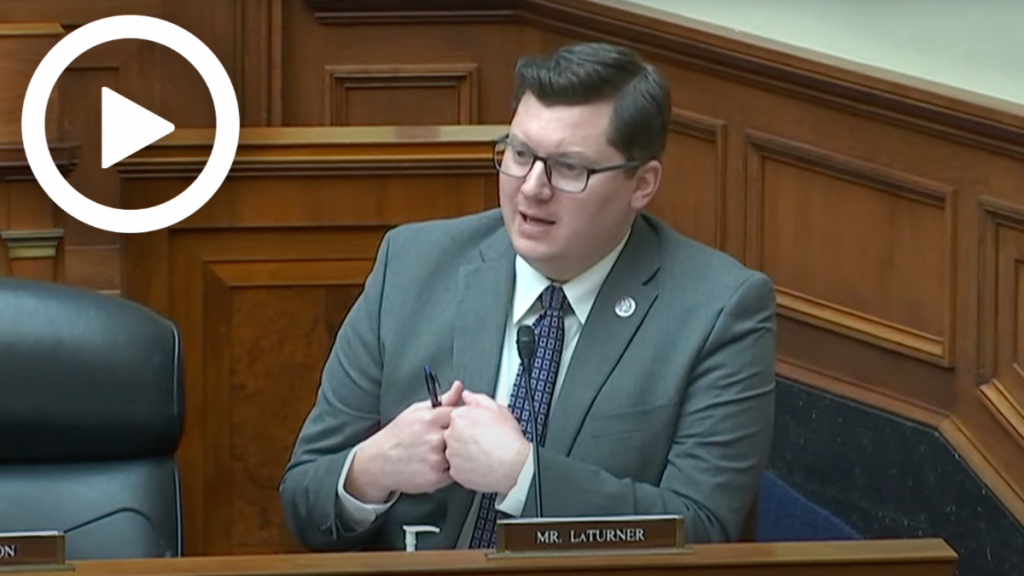Wrap Up: GSA Must Be Held Accountable for Waste and Misuse of Taxpayer Dollars
Federal agencies are spending billionsto lease, maintain and furnish mostly empty office buildings while the federal workforce still largely works from home
WASHINGTON—The House Committee on Oversight and Accountability held a hearing today titled “Oversight of the U.S. General Services Administration.” Members examined the operations of the U.S. General Services Administration (GSA) and explored how the agency can achieve significant savings for taxpayers. Under the Biden Administration, federal telework levels remain elevated with agencies’ D.C. headquarters offices sitting mostly empty. During the hearing, members pressed Administrator Robin Carnahan on GSA’s own headquarters being only 11 percent utilized, despite the agency’s “full re-entry” plan that encouraged employees to return to the office. Members concluded that GSA, as the federal government’s primary real estate agent and property manager, must rein in spending across the federal government and work to ensure taxpayer funds are not wasted on empty, underutilized office space located largely in expensive metropolitan areas.
Key Takeaways:
The Biden Administration wastes billions of taxpayer dollars by maintaining expensive office leases despite the continuation of historically high telework levels. GSA keeps renewing leases and agencies are still splurging on designer furniture, vehicles, travel, and conferences.
Chairman James Comer: “GSA is facing a crisis of confidence. In Washington, D.C.—where most federal agency headquarters are located—much of the 21 million square feet of office space they occupy sits empty. And the Biden Administration doesn’t want to know or understand whether its employees are coming into the workplace. Hundreds of millions of dollars of taxpayer funds are spent annually just to maintain government-owned properties that should be sold off. A billion dollars or more could be saved annually by terminating unneeded federal office space leases. Unused federal space was an issue prior to the pandemic—federal property management has long been on GAO’s High-Risk List—but it’s now become one that is simply too big—and too costly—to ignore.”
Despite the White House Chief of Staff calling on the federal workforce to return to the office, Administrator Carnahan, like many federal employees, works only infrequently from her GSA headquarters office.
Chairman James Comer: “What we found was that Administrator Carnahan did spend a great deal of her time away from D.C.—more than what official travel would require. At a time when the White House chief of staff himself is stressing the importance of in-person work, we want to know if agency heads—including Ms. Carnahan—are leading by example.”
Significant savings for taxpayers is achievable if GSA works to ensure that funds are spent more efficiently on rent, travel, IT and other overhead expenditures across federal agencies, and by consolidating or reducing the inventory of underutilized and empty federal office space.
Chairman James Comer: “GSA has fallen short in executing its mission. Just look at the sudden announcement last week of the proposed FBI headquarters relocation. GSA is at ground zero regarding the amount of office space the federal government leases—and how much it actually uses. GAO’s building occupancy data speaks volumes. So too do the deserted daytime streets, reduced metro ridership, and diminished retail activity in downtown DC. And there are unused and underused federal buildings strewn across the Nation. Hundreds of millions of dollars of taxpayer funds are spent annually just to maintain government-owned properties that should be sold off.”
Chairman Comer announced his support of a bipartisan effort to call on the GSA Inspector General to investigate political interference in the FBI HQ selection process.
Chairman James Comer: “I share Mr. Connolly’s concerns about the way that GSA chose the new FBI headquarters site. The decision implicates hundreds of millions of taxpayer dollars. Yet, GSA altered the original selection criteria… the decision-making process itself was altered. It is now clear to me why these changes were made in the 11th hour. I invite the gentleman from Virginia to join me and request the GSA [Inspector General] to investigate the selection process in this manner.”
Rep. Gerry Connolly (D-Va.): “I would gladly join you in signing such a request.”
Member Highlights:
Chairman Comer emphasized that the GSA has fallen short in its responsibility as the federal government’s supply closet, landlord, real estate agent, motor pool, and IT support. Despite the Biden Administration’s recent calls to rein in out of control telework,, Chairman Comer noted federal agency headquarters still largely sit empty and GSA Administrator Carnahan has failed to lead by example, citing reports and subsequent Committee inquiries that clarified she primarily works far from Washington, DC, where her agency’s headquarters is located.
Chairman Comer: “Unfortunately, GSA has fallen short in executing its mission. According to the Government Accountability Office, 17 of 24 federal agency headquarters buildings in D.C. were operating at 25 percent or less capacity as of March. The six emptiest buildings averaged just nine percent capacity. Half of GSA’s building leases are coming up for renewal in the next five years. So, if employees aren’t going back to work, let’s act accordingly. And we want confidence that the current administrator is up to the task. After we received reports she was rarely in Washington, we sought information. What we found was that Administrator Carnahan did spend a great deal of her time away from D.C.”
Chairman Comer also pressed GSA Administrator Carnahan over wasteful spending of taxpayer dollars on lavish furniture and other non-essential items for office spaces that are currently empty or underutilized.
Chairman Comer: “The American people are fed up with the wasteful spending. And it isn’t just the empty office space costing billions every year, a non-profit transparency group recently found that federal agency spent $3.3 billion dollars on furniture over the past few years. Apparently, to furnish office spaces left mostly empty under maximum telework. Some agencies spent hundreds of thousands of dollars on updating empty conference rooms. Administrator can you explain why the purchasing of federal furniture continued unabated during the pandemic?”
Administrator Carnahan: “So. I can’t speak to specific items that were purchased but I can say that the government did not close down. Agencies were continuing to work, court houses were continued to operate, prisons were operating, the Defense Department was operating. Lots of agencies were in offices, I personally visited Des Moines where throughout the pandemic they were constructing a courthouse…”
Chairman Comer: “Agencies that truly require new furniture can give their old furniture to other agencies or sell it off to private parties. That would take some of the burden off of taxpayers. Now I can’t imagine a big private business spending lavishly on furnishings for an office building that no one works out of. Shareholders would not stand for it. And we can’t stand for it on behalf of the American taxpayer, there has to be a culture shift in the federal government that looks towards cost savings and achieving agency missions in the most efficient ways possible, and I hope GSA hears that message loud and clear.”
Rep. Virginia Foxx (R-N.C.) highlighted the need to save U.S. taxpayer dollars by addressing locality pay for federal workers who continue to work remotely.
Rep. Foxx: “How much would taxpayers save if teleworking employees were paid the wage that corresponds with their actual location of work?”
Administrator Carnahan: “So I think that’s a question I am going to have to ask for OPM because I think they are better suited to be able to answer that.”
Rep. Foxx: “Thank you Mr. Chairman, I think we need to pursue these issues that have been brought forth by Ms. Carnahan and see what Congress can do to force these agencies to downsize and save taxpayers money.”
Rep. Eric Burlison (R-Mo.) stressed that GSA also has a responsibility to accurately account for workplace productivity and measure the impact that their processes have on taxpayer dollars.
Rep. Burlison: “I was encouraged to hear that you talk about that you keep an account of the productivity from some of these agencies. And I wanted to hear if you could elaborate on what systems or methodologies and software that you might be using to actually account for the productivity?”
Administrator Carnahan: “Thanks for the question and we’re just focused on GSA when it comes to our productivity numbers.”
Rep. Burlison: “So just your agency specifically?”
Administrator Carnahan: “Yes and I know that OMB and others will be looking at those numbers and gathering them from other agencies but GSA, as I said, has leaned into telework and remote work for 20 years. Through multiple administrations and we have been very intentional about where we see the results of that, both reducing our footprint, saving money but also better business volume. And as I said, business volume has gone up 82% in the last 10 years, 37% in the last three years which was the most remote the agency has ever been and our customer satisfaction scores have gone up to for us, those are the metrics that really matter and what we pay close attention to.”
Rep. Paul Gosar (R-Ariz.) pressed Administrator Carnahan for information on what percentage of federal acquisitions are items made in America. Administrator Carnahan couldn’t answer his questions.
Rep. Gosar: “The GSA’s arm called the Technology Transformation Service manages Made in America Office, which seeks to enforce federal law to require agencies to buy American. Agencies can seek waivers to buy foreign products. What percentage of federal acquisitions are American made?”
Administrator Carnahan: “As we sit here today, I don’t know that number but I will ask my team to find out and circle back with you sir.”
Rep. Gosar: “How many waivers allowing the agencies to buy foreign made products have been granted under the Biden Administration?”
Administrator Carnahan: “Same answer, I don’t have that as I sit here but we can find out.”
Rep. Gosar: “What trends do the agencies buying American products look like? Are our agencies buying more American made products under the current Administration or less?”
Administrator Carnahan: “It’s a very high priority for the President and the whole Administration to use our federal buying power to support American jobs and American industries, so again I will get back to you with the numbers but just know it’s a priority.”
Rep. Jake LaTurner (R-Kan.) reiterated the importance of returning to in-person work to best serve the American people.
Rep. LaTurner: “Not only has teleworking been proven to be bad for productivity and quality of service, multiple studies since 2020 have shown that remote employees have relatively higher rates of depression and anxiety when compared to their in-office counter parts. Simply put, federal agencies post-pandemic policies do not serve their employees and are a raw deal for taxpayers. It’s past time for the government to join hardworking Americans across our country and return to in-person.”
